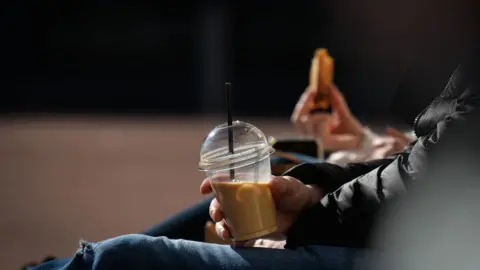Iced coffee can be more sugary than chocolate - Which?
 Getty Images
Getty ImagesIced coffees from high street chains can be more sugary than chocolate and fizzy drinks, research by consumer lobby group Which? has found.
Frappes and frappuccinos from Costa, Starbucks and Caffe Nero were compared, and some found to have "exceptionally high" levels of sugar.
Adults should consume no more than 30g of sugar per day, the NHS says, but one drink had 48.5g.
The companies each separately said they offered alternative choices.
A Mars bar has 31g of sugar, while a 330ml Coca-Cola can has 35g.
Starbucks' caramel frappuccino made with semi-skimmed milk had 48.5g - the highest sugar content of all drinks analysed by Which?
A spokeswoman said the company was committed to helping customers "make informed and improved choices," and they offered options to customise drinks that could reduce the sugar content.
"Sugar content for an iced latte with semi-skimmed milk, one of our most popular beverages, starts from 8.7g for a tall size," the spokeswoman added.
Caffe Nero's Belgian chocolate and hazelnut frappe meanwhile had 44.3g (or 11 teaspoons) of sugar,
It said this drink was a "treat" and made up less than 5% of its summer drinks sales. The company said its iced latte, which is its highest seller, contained no added sugar.
Meanwhile Costa Coffee's chocolate fudge brownie frappe mocha with oat milk had 42.6g of sugar in the survey.
A spokeswoman said it only offered "limited-edition seasonal drinks, including our summer range of frappes, in small and medium sizes".
She added it offered other drinks, some of which contained less than 40 calories, and two teaspoons of added sugar per serving.
"All drinks can also be customised to reduce the calorie or sugar content, including requesting skimmed milk and removing toppings, or downsizing to a smaller cup size," she said.
In 2018 the government introduced a levy known as a "sugar tax," meaning manufacturers pay a levy on high-sugar drinks they sell.
However, some drinks are exempt from the tax, including fruit juices and drinks made on-site and served in open cups. Syrups, often used in frappes, are also exempt.
Nutritionist Shefalee Loth - who carried out the Which? research - said: "High street chains need to take more responsibility and reduce the excessive sugar content of some of their drinks to protect people's health."
Which? suggested consumers wishing to cut their sugar intake switch to iced versions of a standard coffee instead.
How much sugar should we eat?
- According to the NHS, adults should have no more than 30g (around seven teaspoons) of free sugars - sugars added to food or drinks - per day
- Children aged seven to 10 should have no more than 24g (six teaspoons) per day
- Children aged four to six should have no more than 19g (five teaspoons) per day
- The health service said there is no guideline limit for children under the age of four, but it is recommended they avoid sugar-sweetened drinks and food with sugar added to it

Ultra-processed convenience foods contain chemicals that UK regulators say are safe, but Panorama investigates emerging scientific evidence of a link between some of these chemicals and cancer, diabetes and strokes.
Watch on BBC iPlayer now.

